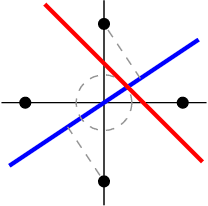Online Lewis Weight Sampling
Paper and Code
Jul 17, 2022


The seminal work of Cohen and Peng introduced Lewis weight sampling to the theoretical computer science community, yielding fast row sampling algorithms for approximating $d$-dimensional subspaces of $\ell_p$ up to $(1+\epsilon)$ error. Several works have extended this important primitive to other settings, including the online coreset, sliding window, and adversarial streaming models. However, these results are only for $p\in\{1,2\}$, and results for $p=1$ require a suboptimal $\tilde O(d^2/\epsilon^2)$ samples. In this work, we design the first nearly optimal $\ell_p$ subspace embeddings for all $p\in(0,\infty)$ in the online coreset, sliding window, and the adversarial streaming models. In all three models, our algorithms store $\tilde O(d^{1\lor(p/2)}/\epsilon^2)$ rows. This answers a substantial generalization of the main open question of [BDMMUWZ2020], and gives the first results for all $p\notin\{1,2\}$. Towards our result, we give the first analysis of "one-shot'' Lewis weight sampling of sampling rows proportionally to their Lewis weights, with sample complexity $\tilde O(d^{p/2}/\epsilon^2)$ for $p>2$. Previously, this scheme was only known to have sample complexity $\tilde O(d^{p/2}/\epsilon^5)$, whereas $\tilde O(d^{p/2}/\epsilon^2)$ is known if a more sophisticated recursive sampling is used. The recursive sampling cannot be implemented online, thus necessitating an analysis of one-shot Lewis weight sampling. Our analysis uses a novel connection to online numerical linear algebra. As an application, we obtain the first one-pass streaming coreset algorithms for $(1+\epsilon)$ approximation of important generalized linear models, such as logistic regression and $p$-probit regression. Our upper bounds are parameterized by a complexity parameter $\mu$ introduced by [MSSW2018], and we show the first lower bounds showing that a linear dependence on $\mu$ is necessary.
 Add to Chrome
Add to Chrome Add to Firefox
Add to Firefox Add to Edge
Add to Edge